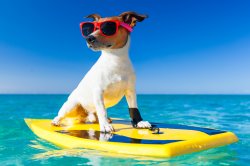Summer Sun Safety
By Carol Miller, BSN, RN
Posted in: Health Tips, Prevention

As the daylight hours become longer, it’s natural to get out in the warm rays of the sun. When natural sunlight hits the skin it will trigger the body to produce Vitamin D which is essential for overall good health and protection against inflammation, high blood pressure, muscle weakness and also improves brain function. However, the ultraviolet (UV) rays of the sun can damage your skin in as little as 15 minutes, increasing the risk of skin cancer. When you think of sunburn, you typically think of a pale, freckled person, not someone with black skin. But people with black skin can get a sunburn right alongside their friend with pale skin. It’s true! Sure, it isn’t as easy to get a sunburn if you have dark skin compared with fair skin, but the risk is still there.
Sun-Safety Strategies
The CDC reports that nearly 5 million people are treated for skin cancer each year in the USA and the numbers have been rising. Here are some simple, summer, sun-safety strategies to help you not become a skin cancer statistic.
- First, reduce your sun exposure by seeking shade under an umbrella, tree, canopy, or any other shade structure that is available. UV rays are strongest during midday during the summer months, therefore try to plan outdoor activity for the early morning or late afternoon.
- When possible wear a wide-brimmed hat, tightly woven fabric clothing and long sleeves, as this can provide protection from the UV rays. Choose sun-protective clothing rated with a UPF rating of 30 or higher or add a wash-in UPF laundry aid to a load of wash. Sunglasses that block both UVA and UVB rays provide the best protection. Not only will this help reduce the risk of cataracts but also protect the skin around the eyes.
- Lastly, put on a broad spectrum sunscreen with at least sun protection factor (SPF) 15 or SPF 30. Anything less will not protect against skin cancer or skin aging. Sunscreen which are water resistant must specify the on the label when to re-apply. The bottom line is that no sunscreen, regardless of strength, should be expected to stay effective longer than two hours without reapplication.
Wear Sunscreen!
Most adults need about one ounce (about the size of an ice cube) to fully cover their body. Shelf life of sunscreens are shorter when exposed to high temperature, therefore do not use past the expiration date stamped on the container. Use lip balms with SPF 15 to protect your lips as well.
Have a sun-safe summer! Make wise choices so that you do not become a skin cancer statistic!
Resources:
www.cancer.org
www.cdc.gov
www.hopkinsmedicine.org
www.aad.org
